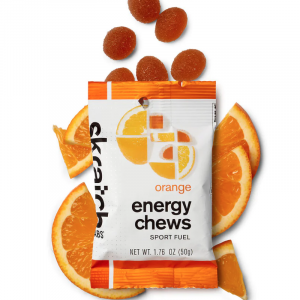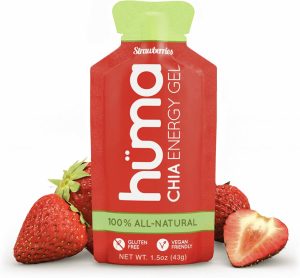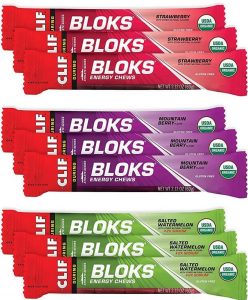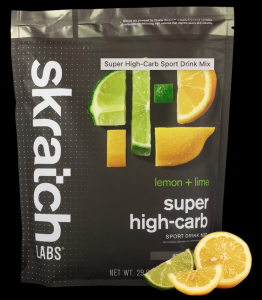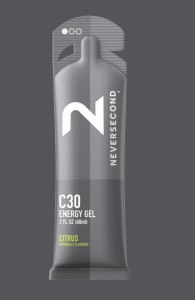If you’ve been following me for awhile, you know that there are two ways to utilize carbs during a race: pulling from our glycogen stores <aka why we carb load> and taking in easily digestible carbs during the race <aka gels, chews, carb drinks>. The goal is to pull from both of these sources during the race, so we always have fuel for our bodies to do the work we are asking it to do.
Carb loading
We have a whole lotta information for you on carb loading! Head over to our carb loading page, which includes a carb load calculator, and a free carb load guide.
Fuel during the race
Gone are the days that it’s neat if you can run a marathon on minimal fuel. We’re seeing a change in tides where some of the best runners are fueling more than we thought necessary or even possible for the human body to utilize & seeing huge performance benefits. <ie. Very fast runners taking >90 gm carbs/hr – aka nearly 4 Maurten gels/hour>.
For years, sports nutrition experts suggested the human body could only utilize 30 – 60 gm carbs/hr during endurance activity. In fact, in 2009, this was the recommendation for endurance athletes. But in time, we realized with different sources of carbohydrates – we can oxidize up to 90 gm carbs/hr.
Now a study of 20 elite ultra runners <competing in a 24 hour race> came out showing 120 gm carbs/hr is even better. Runners were split into 60 gm carbs/hr, 90 gm carbs/hr, & 120 gm carbs/hr. Results were astounding finding 120 gm carbs/hr during this ultra event significantly decreased muscle damage & lowered exercise load <aka perceived exertion> compared to 60 & 90 gm carbs/hr.
In my experience, the majority of runners are consuming <50 gm carbs/hr on race day. While I do not think marathon runners need to aim for 120 gm carbs/hr – these studies & changing science bring to light the fact that more fuel while racing may be very beneficial for performance.
If your race nutrition is suboptimal, take some time to train your gut & practice fueling more. Find the fuel that works for your body. To avoid GI upset, increase fuel week to week during your long runs not all at once.
Takeaway here: assess your race nutrition. Is it enough? If not, let’s work on increasing & finding YOUR sweet spot for grams carbs/hr on race day. While we have science here, it takes experimentation to find what works best of each of us.
Caffeine
Some of us respond well to caffeine during races, some of us do not. It’s genetic. But if you do, and choose to use it on race day – let’s be strategic with the timing to get the most out of our performance from the caffeine.
Caffeine during a race can decrease perceived effort, decrease pain, and increase mental toughness. However, too much caffeine can cause GI upset, increased heart rate & anxiety so we want to be strategic about how much & when we take caffeine gels.
How much we can tolerate depends on our tolerance to caffeine & body size. Research recommends 3 – 6 mg/kg of caffeine during a race. Spoiler alert: for many runners 200 mg falls near or within this range. Therefore, 200 mg of caffeine <aka 2 white Maurten’s> may be the magic sauce for the marathon distance.
When should we take caffeine? Think about the benefits of the caffeine. Think about when you need that extra benefit during your race. For many runners, the second half of the race is when we need that extra ‘make this feel easier’ and ‘mental tenacity’ to hold paces or even increase pace. Research suggests that timing caffeine intake closer to the time of greatest fatigue is the most beneficial.
But, blood caffeine levels peak 1 hour post caffeine consumption – so we want to take these gels before we need them. Aka – let’s get strategic! For example, running a 3 hour marathon and want it to hit in the last 10k? Take it at 90 minutes. Or, running a 4 hour marathon and want support in the last half of the race? Take one at 1 hour & 2 hours. Alternate the other gels with uncaffeinated.
If your gel has 25 or 50 mg of caffeine, think through how much caffeine you want to take in total – then pepper those gels into the mix keeping in mind the 1 hour lag time for full effect.
Bonus knowledge: we can absorb caffeine from our mouth within 30 minutes. Desperate for some last minute caffeine help?! Perhaps hold that gel in your cheek for a little extra time before swallowing <do not have a PMID to support – just my hypothesis>.
Calculating your race day fuel
We all know by now that fueling during a long race is a must, but how much do we take? And how often? If you are not sure where to start, try our race fuel calculator. Grab your preferred fuel choice, flip it over to look at the nutrition facts label, and complete the fields below. Be sure to practice fueling during training runs, so you nail it on race day.
Need more help?
If you need more help with your race day nutrition plan, check out our Customized Race Day Nutrition & Hydration Plan or a Last Minute Crunch Time Session with Meghann.
Race Fuel Products
Below are some examples of race fuel products – you can take a look, give them a try, and decide which works the best for you.






